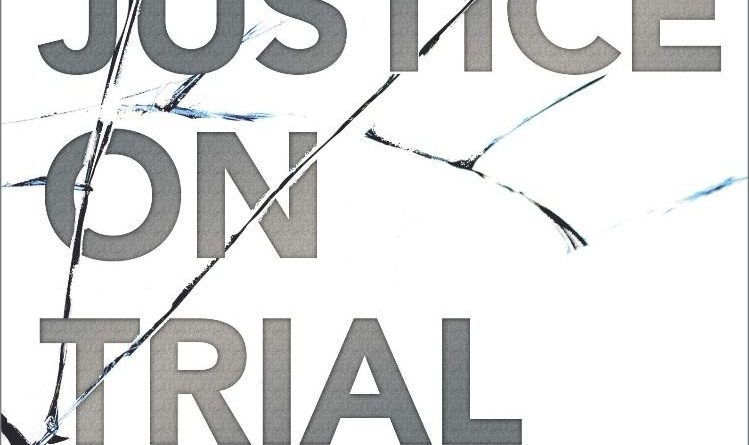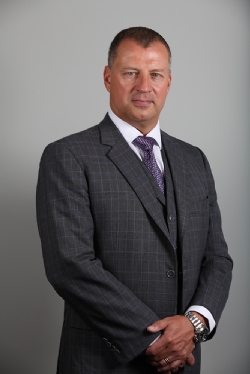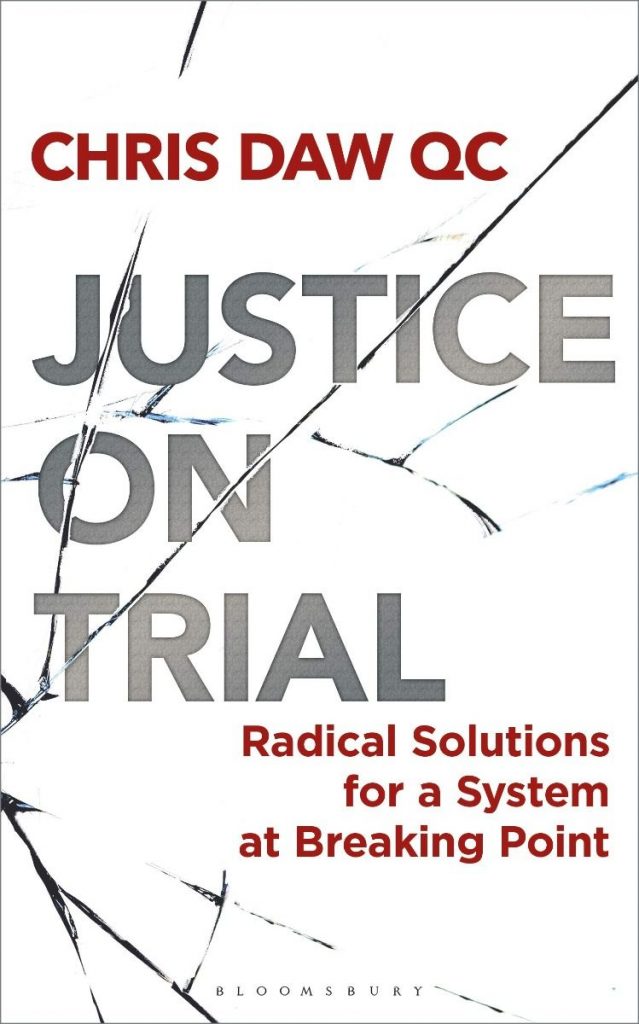Thursday Thinker :Chris Daw QC interview
It’s a Lawyer’s Life in conversation with Chris Daw QC
Chris Daw QC is one of Britain’s top defence barristers and has over 25 years’ experience under his belt. He writes on criminal justice issues for The Spectator and several national newspapers. He appears as an expert source on radio and television, is a prominent legal commentator on social media and co-presenter of the BBC One documentary series Crime: Are We Tough Enough? His book Justice on Trial was published in July of this year.
Rina-Marie Hill is a criminal barrister. She practises from 23ES in London (and of course, is also part of our editorial team). Rina recently caught up with Chris to discuss his new book and to pick his brains on what makes a good lawyer:
Rina: Chris, as you know, I’ve read your book – Justice on Trial – and I’ve also discussed it with others at Women in the Law UK’s monthly book club. (Sally Penni, the founder of WILUK has created a book club with a difference – the author gets an invite)!
Did you have any reservations about accepting the invitation and potentially hearing negative reviews?
Chris: No, I didn’t because, ultimately, I don’t see any feedback as negative. Lots of people on social media have said they completely disagree with me and I’ve seen reviews on Amazon saying: “the book is OK, but he’s a leftie and I disagree with everything he says, etc.” But to be honest, the purpose of writing the book was to get people talking about something that people don’t normally talk about which is criminal justice reform. So, I was happy to attend. It was an interesting group and everyone was really interested in the subject which made me very happy.
Rina: You’re ranked as a leading silk in both the Legal 500 and Chambers & Partners and you draw heavily on your many years of experience as a criminal defence barrister in Justice on Trial. What other resources did you draw upon in preparation for writing the book?
Chris: I posted an advert on LinkedIn for two part-time research positions and received 125 applications, mostly from young lawyers. The researchers I employed (Adam Keenaghan and Lauren Smith), were brilliant and the research they conducted is integral to the book. I also travelled extensively around Europe and the US to visit prisons, interview law enforcement officials, defence lawyers, and people on in the inside of heroin treatment centres. There was a whole range of inputs, but I also drew heavily on my 26 years’ experience at the Bar.
Rina:How much guidance did you give the researchers?
Chris: They had an outline of the book. The commissioning process for the book was that I wrote an article for The Spectator last year about drug legalisation which received a lot of attention. Then I received an email from Bloomsbury (who became my publishers) asking if they could meet me and discuss writing a book. I had to prepare a full outline of each chapter, identify themes and summarise its conclusions. I gave the researchers three chapters each to research and they prepared an extensive but accessible research file for me. They were incredibly bright and diligent and produced exceptionally high-quality research notes.
Rina:I know that you really enjoyed writing Justice on Trial and that you found the freedom to express your own opinions incredibly liberating. The book has three main tenets: the closure of prisons; the legalisation and licensing of drugs; and the criminalisation of children. If you could wave a magic wand and resolve one of these issues only, which would it be, and why?
Chris: I would choose the legalisation and licensing of drugs. It’s the one thing that could be achieved relatively quickly and would have a dramatic impact, in the short-term, with regards to reducing the prison population; reducing crime and violence on the streets; reducing overdoses and exposure to dangerous and harmful substances; reducing the impact of gang crime across the country; and taking children out of the drug supply networks. I think we’d halve the prison population in around five to seven years if we were to legalise and licence drugs.
Rina:You visited a heroin assisted treatment centre in Geneva as part of your research for Justice on Trial. Would you welcome similar treatment centres in the UK?
Chris:One has already been introduced on a trial basis in Glasgow. Home Office approval was required. Glasgow has one of the highest overdose rates in the world and so it was the right place to start. I am hopeful that it will be a success and that centres will open up throughout the UK. Heroin has become a catastrophic national crisis since the introduction of the Misuse of Drugs Act in 1971. There are hundreds of thousands of heroin users and addicts, and people are dying of overdoses. People are committing billions of pounds worth of crime to pay for heroin. If we had a network of heroin assisted treatment centres we would see very, very, quickly a huge reduction in crime and a huge improvement in the health of drug users compared to what we have now.
Rina:I have sat in a cell with many a heroin addict over the last 18 years. It’s an especially powerful and addictive drug, isn’t it?
Chris:Yes, it is, but the main problem for drugs users in Britain isn’t the heroin itself. It’s how to get the heroin and how to pay dealers hundreds of pounds for it. Hundreds of pounds they don’t have.
Another problem is the quality of the heroin: it is either too strong or too weak, or it’s cut with other substances that cause damage to health. Most of the problems around heroin actually disappear once you have a legalised system and a licensed supply chain. Whilst, of course, I don’t advocate people taking heroin, if people are going to take it and get addicted to it, then it’s much better to take it in a safe and sterile environment and to take a known quantity pharmaceutical product rather than heroin that’s been cut with brick dust or rat poison. Safe, legal, licensed supply chains are always better than the criminal alternative.
Rina:Has publishing Justice on Trial given you a platform from which to express your views and reach a new audience?
Chris:I think so. I’m not sure it is as big a platform as my television series (Crime: Are we Tough Enough?) was. The numbers game is in favour of television when it comes to an audience. But when you add to that the serialisation in The Guardian, the very significant range of media activity that stemmed from the book, and the huge range of interviews and podcast and publications, the message is getting out there. Even the Daily Express gave me a whole page to talk about the subject matter of the book and I consider that to be fairly unusual. When you add it all together, I think I’ve reached people with a message which I don’t think is particularly mainstream. I think that is a good thing and I will keep using whatever platform I have created.
Rina:Do you have a target audience or an audience you’d very much like to reach with Justice on Trial?
Chris:Yes. I have two target audiences. If I can reach opinion makers and policy makers and Ministers: those who have some influence over policy in the system, that is plainly very important. They are the people that have the power to pick up some of these ideas and run with them and make them happen. Beyond that, I’d really like to reach a general audience. Members of the public who perhaps have quite strong opinions about the criminal justice system, often based on erroneous news headlines. The book is full of facts and meaty, true crime stories and I hope that it will give people the opportunity to think twice about some of the prejudices and the ideas they may have. Changing opinion on crime and punishment is a bit like changing the path of an oil tanker but you have to start somewhere.
Wellbeing
Rina:I have my own experience of being under intense pressure and stress whilst defending at the criminal Bar. As you know, I no longer practice full-time but share my time between my practice and my essential oils business,Dotty’s Oils. I have learned that my wellbeing is paramount, and I know that you feel the same way. What do you do to ensure that your wellbeing is always on your agenda?
Chris:I‘ve become much better at it recently. I think turning 50 was a milestone for me. I started to do a lot more exercise and I try and keep that as a priority rather than an afterthought. Things like making sure you get plenty of breaks and making sure that you don’t work continuously until the point where you just can’t work anymore. I take more holidays than I used to, with the kids in particular. Even the basics like using some of the meditations Apps. I use Headspace just to get some windows of opportunity to get some calm in my head. Then I can take a few deep breaths and come back a bit stronger. For 15 to 20 years I was flat-out and didn’t think of wellbeing at all.
Good lawyers
Rina:What makes a good lawyer?
Chris:Empathy. I think someone who is empathetic to other people; someone who has a really good understanding of other people and can see things from another person’s point of view makes for a good lawyer. There is also humility. The acceptance that as lawyers we have a part to play, but we are not the most important people in the process. Also, there is judgement. Having good judgement, that is! Knowing when to do things. And when not to. I now know when it’s important to shut up and sit down and say nothing. Likewise, it’s the ability to know when you should do something, when you should intervene or ask a question. I work on the basis nowadays that if I can get through a case without asking any questions, or saying very much, I have probably done a great job.
Rina:Less is more, always! Did you learn the hard way?
Chris:I remember during my first few years of practice going home and lying in bed at night and thinking: “why the hell did I ask that question?” or “why didn’t I sit down two minutes earlier?” or “why did I even need to questions that witness at all?!” You beat yourself up about it. So, I wouldn’t say learning it the hard way, I would just say learning. Full stop. Ultimately, our job is mostly about experience. It’s the most important thing. And when you combine empathy and humility with experience, you tend to get good judgment. Experience is like the jam on the toast.
Rina:And what has experience taught you?
Chris:The one thing we have all experienced as criminal lawyers is asking that one question too many. You know that you should have sat down, but you asked just one more question. It was the question that cocked-up the cross-examination that might otherwise have been very good and very well prepared. I learned from that. All lawyers, and criminal lawyers in particular I think, tend to favour silence over talking.
Rina:We have all asked that one question too many! We have to dust ourselves off and try not to do it again.
Chris:Well, we have to try and be flexible. It’s not always a disaster. It can go either way. But I would say that nine times out of ten the extra question is a mistake.
Cross examination tips
Rina: Can you share some top tips for cross-examination?
Chris:Keep it short. Don’t be wedded to a particular line of cross-examination or a particular style of cross-examination. Be flexible. Cross-examination is about preparation. It’s about not going in there and winging it. You need to know every document and every statement. You get to sound cleverer than you are if you know your papers. You don’t actually have to be clever to work hard and learn what the witness has said in their previous statements and what documents are available. I think the best cross-examinations are not by the cleverest people but the hardest working people. The dream question is the one you can’t lose, either way, whatever the answer is. They are the ones you are really after, but they are very few.
Rina:Where to next? Do you have any plans in the pipeline that you’d like to share with us?
Chris:I am working on a major drama project, a legal drama. I’m hoping it will make it onto Netflix or BBC One. I am exec producing that. We are in the early stages at the moment. I am working on the first episode script at the moment. I’d also love to do a major well-funded documentary series around the themes in the Justice on Trial. I’d like to revisit the places I wrote about in the book and take a film crew with me, to bring the stories to life for a far greater audience.
Rina:Do you have any Netflix recommendations for us?
Chris:I like a bit of comedy. I tend to watch all the new stand-up specials. I like Marc Maron, I don’t know if you’ve come across him? He has a podcast called WTF and he is amazing. He’s a very funny guy. It’s the sort of thing I tend to watch to clear my head. I never watch legal dramas or legal stuff because it drives me nuts and I may as well stay at work.
Rina:Is there any question that you wish interviewers would ask you?
Chris:That one! I’ve never been asked that question. You’ve already cracked it. It’s an interesting question. I guess I’m never asked about my core, driving passion. I’m never asked what I would like to achieve from my wide range of activities in the media, in the law, and so on. And the answer would be to make a difference to social mobility not just in the legal profession but more broadly and be able to give aspiration to young people. I regularly speak at schools in deprived areas.
The thing that depresses me most is not the criminal justice system because I accept there will always be misery in the criminal justice system of one kind or another; it is never going to be a happy place. But to see school children with no aspiration and no ambition who have already given up on life by the age of twelve or younger, that’s the most depressing thing of all. They have no vision that their life could involve a good education, could involve a successful career. They are already, in their head, going to repeat the same patterns that they see around them of failure and unemployment and very low educational attainment. About a year ago I received an email, out of the blue, from a young man who said that he had listened to me speak at an awards ceremony at my old comprehensive school in Milton Keynes. He told me that he was so inspired by my speech that he went on to get a degree and had just qualified as a solicitor. It was one of the loveliest emails I have ever received. That is a far greater achievement for me than winning a massive case or getting a big cheque for it. If I can make tiny, marginal differences to the outcomes for young people who otherwise might not do anything with their lives, that is really important to me.
Rina:That’s great to hear. Thank you, Chris, for your time.
Chris:You’re welcome. Good to talk.
Justice on Trial is available to purchase now in all good bookstores!
Chris is a member of Lincoln House Chambers and Millennium Chambers.
He tweets at: @crimlawuk and posts topical legal content on his YouTube channel – Chris Daw QC – and on LinkedIn.




